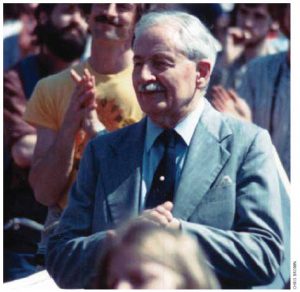
“I can remember many people who go a long, long way back in our history,” my father told an interviewer in 1970. “I remember one man who was elected to Parliament in 1867, half a dozen who were elected in 1874 … Sometimes [with] classes in Canadian government, I’m able to say, ‘Oh, no you’ve got his name wrong. I knew him.’ And they look at me as if I had suddenly walked down the plank from Noah’s Ark!”
The late Eugene Forsey — senator, constitutional expert, trade union historian and political watchdog — was a lively part of Canada’s public life for more than half a century. A proud Newfoundlander and Canadian, he exemplified the kind of active, engaged citizenship that forms the only true basis for a viable democracy.
Canadian democracy — its development, its constitutional mechanisms and its role in creating a better world — was a central concern for my father right up until his death in 1991. Growing up in the Ottawa home of his grandfather Bowles, who was chief clerk of votes and proceedings for the House of Commons, young Eugene absorbed, at his mother’s knee, a passionate interest in politics that would largely define his subsequent careers in academia, the labour movement and Parliament itself.
In 1943, after being sacked from his teaching post at McGill University for his socialist views, he set off a firestorm in political circles with the publication of his doctoral thesis on the “reserve powers” of the Crown. In a very public debate, he attacked Mackenzie King for his shameful attempt to circumvent Parliament in the “King-Byng crisis” of 1926, and defended both Gov.-Gen. Byng and Tory leader Arthur Meighen, who briefly succeeded King as prime minister following the crisis. Meighen had been one of my father’s boyhood heroes, and he became a close friend and mentor, not only in matters parliamentary, but also in terms of intellect, integrity and personal kindness.
My father’s public reputation as a feisty combatant grew from his many articles, speeches, and letters to the newspapers on subjects as varied as “constitutional fairytales,” injustices to workers and minorities, public artworks and the perils of privatization. The media loved him for the cogency of his arguments and the wit and fiery eloquence with which he delivered them. One columnist noted his “ability to cut to the quick with two lines of elegant vituperation;” another called him “the owner of the most trenchant typewriter in the country.”
What my father himself once described as his “inability to be frank and diplomatic at the same time” regularly got him into hot water. During his six weeks in India in 1953 as co-director of a World University Service seminar, he noted in a lecture that, of the Canadian and American constitutions, the Canadian was much the more modern document. “To liven what I felt was a somewhat tedious discourse,” he recalled later, “I was foolish enough to say that the American Constitution was an 18th-Century sedan chair, which only the political genius of the American people enabled them to manoeuvre through modern traffic. I had spoken lightly of sacred things. The Americans were deeply hurt. Their chief delegate told me: ‘We always think of the Canadians as just like us.’ I felt inclined to say that was just the trouble, but she was so distressed that I hadn’t the heart.”
Not surprising, then, that he turned down Pierre Trudeau’s 1968 offer of a posting as ambassador to the Vatican. What he did accept was a seat in the Senate. The Hon. Eugene Forsey finally became part of Parliament, the institution he had loved and defended all his life. Canada and Canadians were the beneficiaries.
Guest writer Helen Forsey is a writer and activist who divides her time between in Eastern Ontario and Newfoundland’s Avalon Peninsula. Her recent book about her father’s legacy, Eugene Forsey, Canada’s Maverick Sage, is published by Dundurn.





